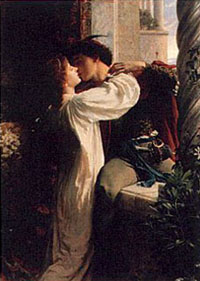
Between tragedy and comedy the transition is often but slightly marked. Thus Romeo and Juliet differs but little from most of Shakespeare's comedies in its ingredients and treatment--it is simply the direction of the whole that gives it the stamp of tragedy. Romeo and Juliet is a picture of love and its pitiable fate in a world whose atmosphere is too sharp for this, the tenderest blossom of human life. Two beings created for each other feel mutual love at the first glance; every consideration disappears before the irresistable impulse to live for one another; under circumstances hostile in the highest degree to their union, they unite themselves by a secret marriage, relying simply on the protection of an invisible power. Untoward incidents following in rapid succession, their heroic constancy is within a few days put to the proof, till, forcibly separated from each other, by a voluntary death they are united in the grave to meet again in another world.
All this is to be found in the beautiful story which was told long before Shakespeare's day, and which, however simply told, will always excite a tender sympathy; but it was reserved for Shakespeare to join in one ideal picture purity of heart with warmth of imagination; sweetness and dignity of manners with passionate intensity of feeling. Under his handling, it has become a glorious song of praise on that inexpressible feeling which ennobles the soul and gives to it its highest sublimity, and which elevates even the senses into soul, while at the same time it is a melancholy elegy on its inherent and imparted frailty; it is at once the apotheosis and the obsequies of love. It appears here a heavenly spark that, as it descends to earth, is converted into the lightning flash, which almost in the same moment sets on fire and consumes the mortal being on whom it lights. All that is most intoxicating in the odor of a southern spring, all that is languishing in the song of the nightingale or voluptuous in the first opening of the rose, all alike breathe forth from this poem. But even more rapidly than the earliest blossoms of youth and beauty decay does it, from the first timidly bold declaration and modest return of love, hurry on to unlimited passion, to an irrevocable union; and then hasten, amid alternating storms of rapture and despair, to the fate of the two lovers, who yet appear enviable in their hard lot, for their love survives them, and by their death they have obtained an endless triumph over every separating power. The sweetest and the bitterest love and hatred, festive rejoicings and dark forebodings, tender embraces and sepulchral horrors, the fullness of life and self-annihilation, are here all brought close to each other; and yet these contrasts are so blended into a unity of impression, that the echo which the whole leaves in the mind resembles a single but endless sigh.
The first scenes of nearly every play of Shakespeare are remarkable for the skill with which they prepare the mind for all the after scenes. We do not see the succession of scenes; the catastrophe unrevealed; but we look into a dim and distant prospect, and by what is in the foreground we can form a general notion of the landscape that will be presented to us, as the clouds roll away and the sun lights up its wild mountains or its fertile valleys. When Sampson and Gregory enter "armed with swords and bucklers"--when we hear "a dog of the house of Montague moves me"--we know that these are not common servants, and live not in common times; with them the excitement of party spirit does not rise into strong passion--it presents its ludicrous side. They quarrel like angry curs, who snarl, yet are afraid to bite. But the "furious Tybalt" in a moment shows us that these hasty quarrels cannot have peaceful endings. The strong arm of authority suspends the affray, but the spirit of enmity is not put down. The movement of this scene is as rapid as the quarrel itself. It produces the effect upon the mind of something which startles; but the calm immediately succeeds. Benvolio's speech--
Madam, an hour before the worshipp'd sun
Peer'd forth the golden window of the east ...
--at once shows us that we are entering the region of high poetry. Coleridge remarks that the succeeding speech of old Montague exhibits the poetical aspect of the play even more strikingly:
Many a morning hath he here been seen,
With tears augmenting the fresh morning's dew.
It is remarkable that the speech thus commencing, which contains twenty lines as highly wrought as anything in Shakespeare, is not in the first copy of this play. The experience of the artist taught him where to lay on the poetical coloring brighter and brighter. How beautifully these lines prepare us for the appearance of Romeo--the now musing, abstracted Romeo--the Romeo, who, like the lover of Chaucer,
Solitary was ever alone,
And walking all the night, making moan.
The love of Romeo was unrequited love. It was a sentiment rather than a passion--a love that solaced itself in antithetical conceits upon its own misery, and would draw consolation from melancholy associations. It was love without the "true Promethean fire," but it was a fir preparation for what was to follow. The dialogue between Capulet and Paris prepares us for Juliet--the "hopeful lady of his earth," who
Hath not seen the change of fourteen years.
The old man does not think her "ripe to be a bride;" but we are immediately reminded of the precocity of nature under a southern sun, by another magical touch of poetry, which tells us of youth and freshness--of summer in "April"--of "fresh female buds" breathing the fragrance of opening flowers. Juliet at length comes. We see the submissive and gentle girl; but the garrulity of the nurse carries us back even to the
Prettiest babe that e'er I nursed.
Neither Juliet nor Romeo had rightly read their own hearts. He was sighing for a shadow--she fancied that she could subject her feelings to the will of others:
But no more deep will I endart mine eye,
Than your consent gives strength to make it fly.
The preparation for their first interview goes forward; Benvolio has persuaded Romeo to go to the Capulet's feast. There is a slight pause in the action, but how gracefully it is filled up! Mercutio comes upon the scene, and is placed by the side of Romeo, to contrast with him, but also to harmonize. The poetry of Mercutio is that of fancy; the poetry of Romeo is that of imagination. The wit of Mercutio is the overflow of animal spirits, occasionally polluted, like a spring pure from the well-head, by the soil over which it passes; the wit of Romeo is somewhat artificial, and scarcely self-sustained--it is the unaccustomed play of the intellect when the passions "have come to the clenching point," but it is under control, it has no exuberance which, like the wit of Mercutio, admits the coloring of the sensual and the sarcastic.
The very first words of Romeo show the change that has come o'er him. He went into that "hall of Capulet's house" fearing
Some consequence yet hanging in the stars.
He had "a soul of lead"--he would be "a candle-holder and look on." But he has seen Juliet; and with what gorgeous images has that sight filled his imagination!
Oh, she doth teach the torches to burn bright!
Her beauty hangs upon the cheek of night
As a rich jewel in an Ethiop's ear.
We have now the poetry of passion bursting upon us in its purple light.
The lovers show the intensity of their abandonment to an overmastering will. "They see only themselves in the universe." That is the true moral of their fate. But, even under the direst calamity, they catch at the one joy which is left--the short meeting before the parting. And what a parting it is! Here again comes the triumph of the beautiful over the merely tragic. They are once more calm. There love again breathes of all the sweet sights and sounds in a world of beauty. They are parting, but the almost happy Juliet says:
It is not yet near day--
Believe me, love, it was the nightingale.
Romeo, who sees the danger of delay, is not deceived:
It was the lark, the herald of the morn.
Then what a burst of poetry follows!--
Night's candles are burnt out, and jocund day
Stands tiptoe on the misty mountains' tops.
Note the exquisite display of womanly tenderness in Juliet, which hurries from the forgetfulness of joy in her husband's presence to apprehension for his safety. After this scene we are almost content to think, as Romeo fancied he thought:
Come what sorrow can,
It cannot countervail the exchange of joy.
The sorrow does come upon poor Juliet with redoubled force. The absolute father, the unyielding mother, the treacherous nurse--all hurrying her into a loathed marriage--might drive one less resolved to the verge of madness. But from this moment her love has become heroism. She sees
No pity sitting in the clouds--
She rejects her nurse--she resolves to deceive her parents. This scene brings out her character in its strongest and most beautiful relief.
The final catastrophe comes. They have paid the penalty of the fierce hatreds that were engendered around them, and of their own precipitancy; but their misfortunes and their loves have healed the enmities of which they were the victims.
